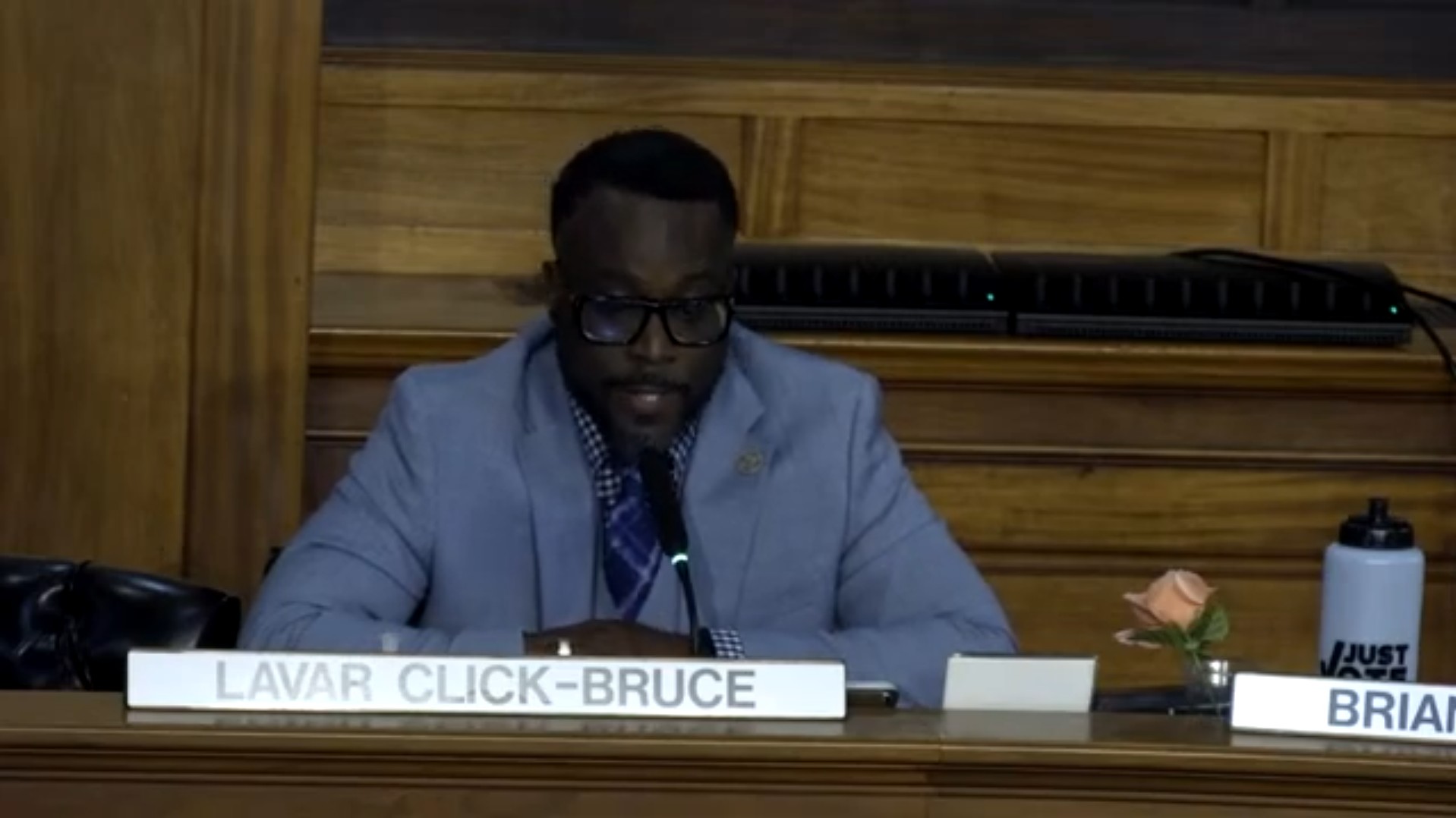Ward 5 City Councilor Lavar Click-Bruce explains to the full council why it is important to create stricter laws around drugs near playgrounds and schools.
Photo credit: Focus Springfield
SPRINGFIELD — Councilors took next steps in their pursuit of stricter drug laws in the commonwealth around playgrounds and schools.
During its regular meeting on Sept. 15, the City Council voted unanimously to refer a resolution that asks the Massachusetts state Legislature to amend its current law, which At-Large City Councilor Brian Santaniello said has “more holes in it than Swiss cheese.”
The resolution will be discussed at a future joint Public Safety and Health and Human Services Committee meeting.
“We in Springfield and Hartford, Connecticut, are a hub to I-91 for drug distribution,” said Santaniello, an original sponsor of the resolution with Ward 5 City Councilor Lavar Click-Bruce. “So, we looked at the drug-free zone to see if we could start protecting our children who go to school in those areas, our senior citizens [and] people who use our parks and playgrounds.”
The current state law states that drug activity must occur within 300 feet of a school zone and 100 feet within a playground for that person to be in violation of the statute. Click-Bruce and Santaniello’s resolution urges the state to increase that distance to 500 feet for both.
The law also states that there are no drug-free zones between the hours of midnight and 5 a.m., and a threat of violence must emerge during a drug transaction to qualify as a violation of the statute. The councilors’ resolution advocates for the elimination of those requirements, thereby streamlining and simplifying the process of catching perpetrators.
According to the resolution, the councilors want to make sure that the statute applies to all drug possession and drug sales taking place within 500 feet of a school, park or playground, regardless of time of day or the specific background circumstances of the crime.
The goal of this initiative, according to Click-Bruce, is to protect families in Springfield.
“Right now, the [state] laws benefit drug dealers,” Click-Bruce said. “We need laws that protect and uplift our law-abiding citizens.”
The two councilors have been working on this resolution for weeks. The duo conducted a press conference in July with Parks, Buildings and Recreation Management Director Tom Ashe at Johnny Appleseed Park to tour the land and see the exorbitant amount of trash people leave overnight. During the walkthrough, Reminder Publishing observed alcohol nips, drug paraphernalia, Dunkin’ Styrofoam cups and other types of trash strewn throughout the park.
In an interview, Ashe said the city’s crews spend “all day every day” cleaning up big trash and little trash across the 52 parks across the city. Oftentimes, he said a crew will spend half the day cleaning Johnny Appleseed Park alone.
He added at a June Health and Human Services Committee meeting the city could “fill a truck” with the number of syringes they find daily, and said that children are barely in the parks during summer vacation due to the daily trash problems.
Click-Bruce, a basketball coach at John Duggan Academy, said during the Sept. 15 council meeting that he and the players who participate in summer basketball leagues have seen the drug paraphernalia firsthand.
“It’s not hearsay, I’m not doing this for a photo opp,” Click-Bruce said. “I see firsthand, it’s a problem.”
In the past, Springfield Lt. Jamie Bruno noted that it is a challenge to enforce the current state law around drugs near playgrounds and schools because there are no mandatory sentences attached to it, which means it is at the court’s discretion for enforcement.
Click-Bruce and Santaniello’s resolution presents a much “clearer” and more “effective” route to deterring these activities, according to City Council Attorney Ken Shea.
“It’s much cleaner, much better and much easier to enforce in the court of law,” Shea said during the meeting.
Councilors commended Click-Bruce and Santaniello for putting forth the resolution. All of them were sponsors of the legislation by the end of the discussion.
“I just want to show my state of appreciation for the injection of common sense and the simplification of an issue that is not complicated,” said Ward 3 City Councilor Melvin Edwards. “It should not be a debatable issue.”
At Large City Councilor Kateri Walsh agreed with Edwards’ sentiment.
“I like a lot of provisions of this proposal, particularly the hours and oversimplifying the law,” Walsh said. “I think it’s going to be very effective, and maybe we’re going to set a standard for the whole state.”
Ward 8 City Councilor Zaida Govan wondered if the resolution could include alcohol as part of its drug-free commitment, noting the empty nip bottles issue and ubiquity of liquor stores as reasons for including that language.
Click-Bruce said the subcommittees will consider adding Govan’s recommendation at the future joint meeting.
“I totally agree with making the changes to the law,” Govan said. “I’m hoping that we’ll be able to make that happen, because it’s absolutely something that we need to do.”
Ward 6 City Councilor Victor Davila called the resolution “brilliant” and said he looks forward to supporting it.
“I think it sends a clear message that we’re not going to tolerate drug dealing,” Davila said.
If the resolution passes the council, it will head to the state Legislature. In the event that no action is taken at the state level, the city of Springfield could file a home rule petition under Massachusetts law, “seeking to accomplish the restoration of critical protections for children being sought through this resolution.”


